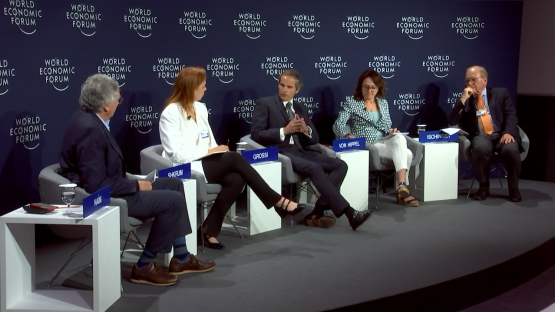Nuclear provides the opportunity for a faster transition to a low-carbon energy future and supports the shift to a hydrogen economy, IAEA Director General Mariano Grossi told participants at the World Economic Forum (WEF) Annual Meeting this week. Attending the gathering on Tuesday and Wednesday in Davos, Switzerland, Mr Grossi met with world leaders and discussed the decarbonization potential of nuclear energy for meeting global climate targets. He also discussed IAEA activity in relation to Ukraine and Iran.
The WEF is an international organization focused on fostering public-private cooperation. Its Annual Meeting attracts thought leaders from around the world to share their insights on pressing global issues.
In an opinion piece on the WEF website, Mr Grossi said that nuclear is gaining increasing support in the battle against climate change, that reaching net-zero carbon emissions will require a doubling of nuclear capacity, and that technology such as small modular reactors (SMRs) and spent fuel repositories are increasing nuclear accessibility and safety.
“Forty per cent of today’s operating nuclear power plants were built as a result of the last major energy crisis and now – after considerable upfront costs – supply some of the cheapest electricity in the world,” Mr Grossi wrote, explaining that today more than 440 nuclear reactors operating across the world produce one-quarter of its low-carbon electricity, and more than 50 reactors are currently under construction.
The Director General made the case that as innovations, such as SMRs, come to market, they will present more options to countries and industries. Mr Grossi wrote that SMRs will be quicker and more affordable to build, have a greater level of inherent safety due to their design, offer more flexibility for pairing with solar and wind energy, and are being developed by many countries around the world.
In March, the IAEA launched a new initiative, the Nuclear Harmonization and Standardization Initiative (NHSI), to accelerate and facilitate the effective global deployment of safe and secure SMRs and other advanced nuclear technologies, so as to maximize their contribution to sustainable development and climate targets.
Speaking today on the WEF panel ‘A Nuclear Option?’ with Poland’s Minister of Climate and Environment Anna Moskwa, newcleo Ltd Founder and Chief Executive Officer Stefano Buono, and moderated by Thomson Reuters Editor Dmitry Zhdannikov, Mr Grossi emphasized the importance of nuclear power in Europe’s energy mix and growing interest in nuclear globally. A recording of the event is available for replay.
“In many places we see nuclear being considered as an interesting element in this family of efforts, to have a normal reconciliation of economic growth sufficiently powered, and care for the environment,” Mr Grossi said.
Mr Grossi answered a question from the audience about the ongoing status with Iran, and said revival of the JCPOA — sometimes referred to as the ‘Iran nuclear deal’ — is going through a “a great deal of difficulty” because of non-nuclear related issues. He said that the IAEA was working with the country to resolve a number of other outstanding safeguards issues.
Forty per cent of today’s operating nuclear power plants were built as a result of the last major energy crisis and now – after considerable upfront costs – supply some of the cheapest electricity in the world.







